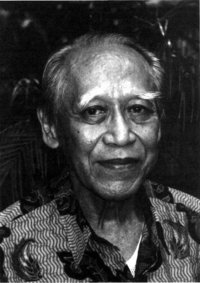Koentjaraningrat
Koentjaraningrat | |
|---|---|
 | |
| Born | 15 June 1923 |
| Died | 23 March 1999(aged 75) Jakarta,Indonesia |
| Scientific career | |
| Fields | Anthropology |
Kanjeng Pangeran Haryo Koentjaraningrat([kʊntʃaraˈniŋrat];15 June 1923 – 23 March 1999) was an Indonesiananthropologist.He is sometimes referred to as "the father of Indonesian anthropology".[1]
Biography
[edit]Koentjaraningrat was born inYogyakarta,Indonesiaon 15 June 1923 to aPakualamanfamily. His mother wanted him to obtain a Dutch education, so he was educated at Europeesche Lagere School, followed by Middelbare Uitgebreid Lager Onderwijs and Algemeen Middelbare School in Yogyakarta, later moving toJakartato continue his schooling. He became fluent in Dutch and English.[1]
During theJapanese occupation of the Dutch East Indies,Koentjaraningrat was working at theNational Library of Indonesia.He was tasked with escorting books from Jakarta to Yogyakarta for safekeeping. He later enrolled atGadjah Mada University,majoring inIndonesian literature,because the political situation did not allow him to return to Jakarta.[1]
After the Japanese withdrawal from Indonesia, Koentjaraningrat joined the 29th Brigade of the Student Forces as an English and history teacher. He was stationed inKediriand laterMojoagung,East Java.[1]
Koentjaraningrat moved to Jakarta after graduating from Gadjah Mada and taught atBoedi OetomoHigh School. He later enrolled at theUniversity of Indonesiato earn adoctorandusdegree inIndonesian languageandliterature.After graduating in 1952, he stayed on to work with G. J. Held, professor of anthropology at the time.[1]Koentjaraningrat later commented, regarding his choice to enter anthropology, that it was his only chance to go to theUnited States.[2]
On 29 April 1954, Koentjaraningrat became engaged to Kustiani Sarwano, whom he met at the Faculty of Arts in Jakarta. That same year Koentjaraningrat received aFulbright Scholarshipand studied atYale UniversityinNew Haven,Connecticut,United States underGeorge Murdock.The following year, he and Kustiani were married. The ceremony took place in Jakarta, while Koentjaraningrat was inNew Haven.He was represented by akris(an Indonesian dagger). Kustiani later joined him in New Haven.[1]
At Yale, Koentjaraningrat worked to add information on Indonesia to the Human Relations Area Files. He graduated in 1956 and returned to Indonesia. His thesis,A Preliminary Description of the Javanese Kinship System,was published the following year as a Cultural Series Report by Yale's Southeast Asia Studies Program. In 1999, it was described as "still the best single account of the subject."[1]
Upon returning to Indonesia, Koentjaraningrat introducedClyde Kluckhohn's scheme for variations in value orientation. He also enrolled at the University of Indonesia and started his doctoral studies under the supervision of Elizabeth Allard. In 1957, Koentjaraningrat established Indonesia's first anthropology department at the University of Indonesia.[2]The following year, he graduated. His dissertation was titledBeberapa Metode Anthropologi dalam Penjelidikan2 Masjarakat dan Kebudajaan di Indonesia(EYD:Beberapa Metode Anthropologi dalam Penyelidikan-penyelidikan Masyarakat dan Kebudayaan di Indonesia,(English:Various Anthropological Methods in the Study of Indonesian Society and Culture).[1]
In 1962, Koentjaraningrat was made professor of anthropology at the University of Indonesia. He sent his students to teach basic anthropology at various universities, including theUniversity of North SumatrainMedan,PadjadjaraninBandung,Gadjah Mada in Yogyakarta,UdayanainDenpasar,HasanuddininUjung Pandang,Sam Ratulangi UniversityinMenado;andCenderawasih UniversityinJayapura.These teachings formed the foundation for the anthropology departments at the respective universities.[1]
In 1964, Koentjaraningrat founded theLembaga Ilmu Pengetahuan Indonesia(English:Indonesian Centre for Knowledge).[2]In 15 years, he wrote several major textbooks for anthropology and social science research for the use of his students.[1]
Among his publications arePengantar Antropologi(English:Introduction to Anthropology), published in 1959,Tokoh-Tokoh Antropologi(English:Prominent Figures in Anthropology), published in 1964,Beberapa Pokok Antropologi Sosial(English:Various Fundamentals of Social Anthropology), published in 1967,Atlas Etnografi Sedunia(English:A World Atlas of Ethnography), published in 1969,Metodologi Penelitian Masyarakat(English:Social Studies Methodology), published in 1973,Bunga Rampai Kebudayaan, Mentalitet dan Pembangunan(English:The Basics of Culture, Mentality, and Development), published in 1974, andKebudayaan Jawa(English:Javanese Culture), which was published in both Indonesian and English in 1984.[1]
Koentjaraningrat retired in 1988. After retirement, he enjoyeddrawing.His drawings have been displayed atTaman Ismail Marzukiand inParis.[3]In 1997, despite failing health and having suffered numerousstrokes,he and his wife made thehajj.[1]
Koentjaraningrat died at age 76 on Tuesday, 23 March 1999 around 16:25WIBin Kramat 128 Hospital,Central Jakartaas a result of a stroke and complications fromdiabetes.He was buried atKaret Bivak Public Cemetery.[3]
Awards
[edit]During his career, Koentjaraningrat received many awards and honours. He received the Satyalencana Dwidja Sistha twice, in 1968 and 1982, the Bintang Jasa Utama in 1994, and the Bintang Mahaputra Utama posthumously in 1999 from the Indonesian government. In 1976 he received anhonoris causadoctorate from theUniversity of Utrecht.He was named Lecturer of the Year by theAssociation of Southeast Asian Institutions of Higher Learningin 1968. In 1990, Sri Paduka Paku Alam VIII conferred upon him the title of Kanjeng Pangeran Haryo.[1]In 1995, he was awarded theFukuoka Asian Culture Prize.[4]In 1997, he received thePenghargaan Ilmu-Ilmu Sosial(English:Social Studies Honour) from the Indonesian Association for the Development of the Social Sciences.[1]
References
[edit]- ^abcdefghijklmnFox, James J. "In Memoriam: Professor Koentjaraningrat".Bijdragen tot de Taal-, Land- en Volkenkunde 157 no: 2.Leiden. 2001. Pp. 239-245Archived2011-09-28 at theWayback Machine
- ^abc"Koentjaraningrat (1923–2000)"The Routledge Dictionary of Anthropologists.
- ^ab"Meninggal"Tempo30 March 1999.(in Indonesian)
- ^"Grand Prize: Koentjaraningrat"The Fukuoka Asian Culture Prize.
